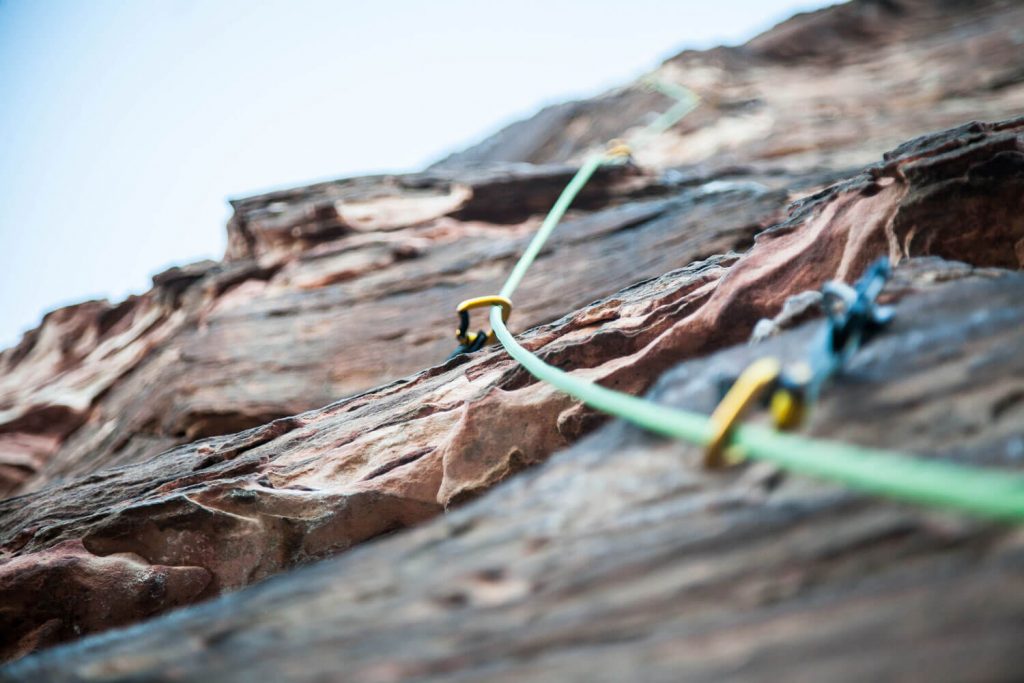
By Devon
There I was, hanging from the precipice, muscles trembling, fingers aching, sweat dripping onto my spotter twenty feet below. He could see I was struggling, and shouted words of encouragement, but my head was pounding too loudly to make out the words. During the initial ascent, I felt strong and confident, though the intense scope of the route had begun to loosen my physical grip, as well as my grip on reality. I made it to the final hold, exhausting every drop of energy, unable to fathom lifting my arm again. The wall then became a towering mental blockade. I knew exactly where to put my hand next, yet I still didn’t feel as if I had the physical means of doing so. I screamed and shot my hand up in a final attempt to finish the climb. I was only hanging on by my fingertips and sheer determination, nevertheless I had made it to the top. My belayer celebrated and lowered me down. Weak and exhausted, I could barely unclip myself from the harness; however, mentally I had never felt stronger.
It is during these experiences that the world falls away; all that is left is the rock face itself. I become one with the wall, solely captivated by the placements of its holds and the complexity of its challenge. Time ceases to exist.
Rock climbing is a second language to me. I grew up scaling the tallest trees I could find, desiring the highest vantage point. Growing up in the uniformly flat state of Florida, I was limited in my upward journey. Luckily, I rekindled my love for climbing in high school, and now cannot imagine life without it. My passion for climbing is fueled by the adrenaline that pumps through my veins.
At first, I was an impatient climber who would try and solve the wall before me, making split-second decisions. However, this strategy rapidly tired me out after beginning to climb. Clearly, this method wasn’t going to get the job done; I had to change my mindset. Now, when I approach a wall, I first draw the problem out in my mind, using my hands to examine the holds. Like a game of chess, I lay out an intricate plan of attack. If I am completely perplexed by a wall, I converse with other pro climbers to guide me towards the best route. Every time I interact with climbers better than myself, I learn a new technique and create new bonds. Being part of the rock climbing community has helped me develop my social skills.
The best things about climbing is that there is no clear-cut way to climb a wall, and that there is always a new challenge. My climbing partners say that I take the most unorthodox routes when climbing, but ironically they’re the most natural and comfortable paths for me. I get lost in the walls and climb for hours, as time becomes irrelevant. I think of nothing else but reaching the last hold and forget all of my worries. Even when my friends beg to go home from fatigue, I insist on attempting another route. I don’t feel I’ve had a sufficient climbing session until my forearms are pulsing and the skin on my fingertips are raw.
Patience, collaboration, and determination are all needed when climbing a wall, like in any field of research. I no longer say I can’t do something, instead approaching challenges with the utmost confidence. If one plan falls short, I reassess and approach the wall from another angle. I am comfortable making decisions, even when I don’t know what the outcome may be. Through this life-changing sport I have strengthened not only my body but also my mind, learning the beauty of problem solving.
Admissions Committee Comments
Devon opens his essay with a story that is relatable to many: Struggling through a difficult activity (rock climbing in this instance) yet feeling determined to finish. The author effectively expands from this one experience to how his learning style has changed in the past few years. Through his essay, we get a sense of Devon’s growth mindset and can envision him continuing to develop as a student and individual once on our campus.





